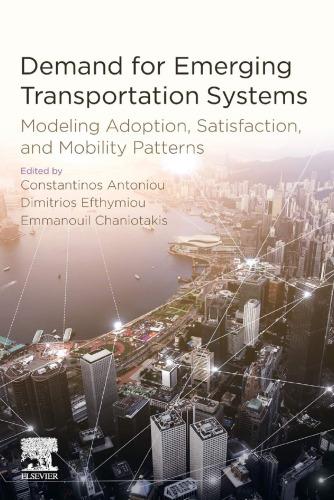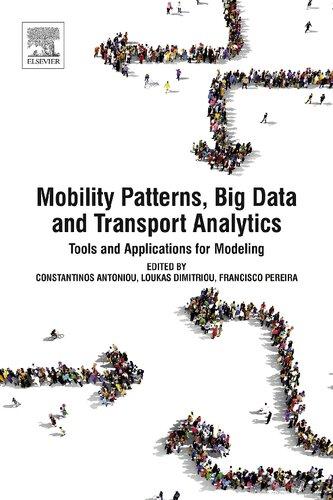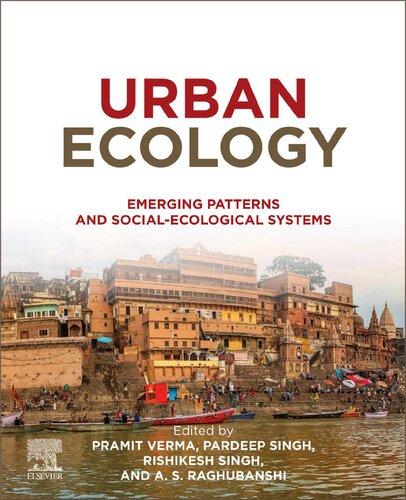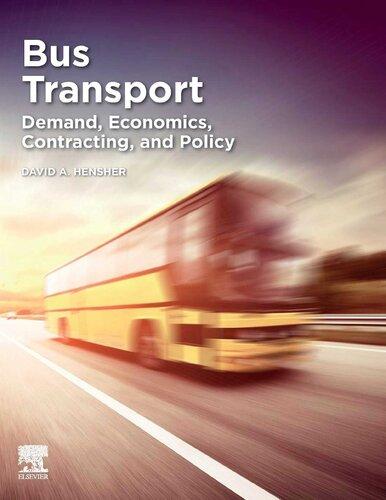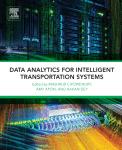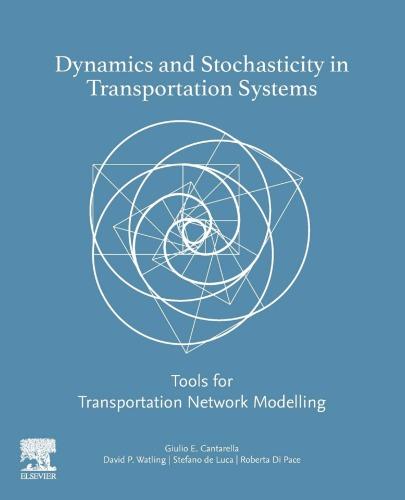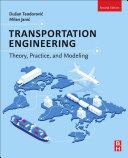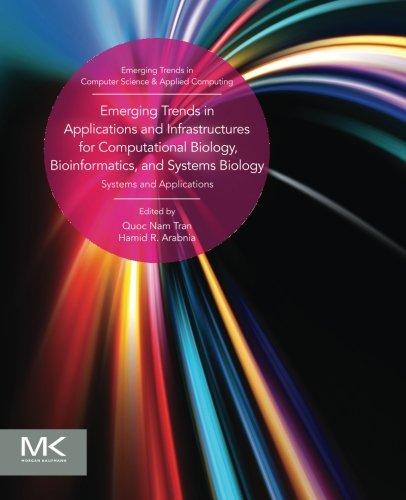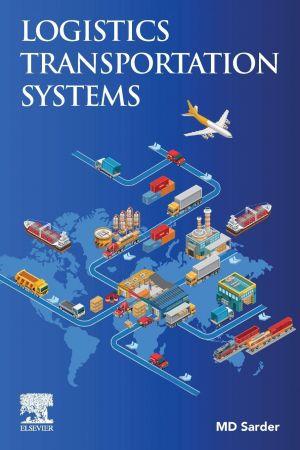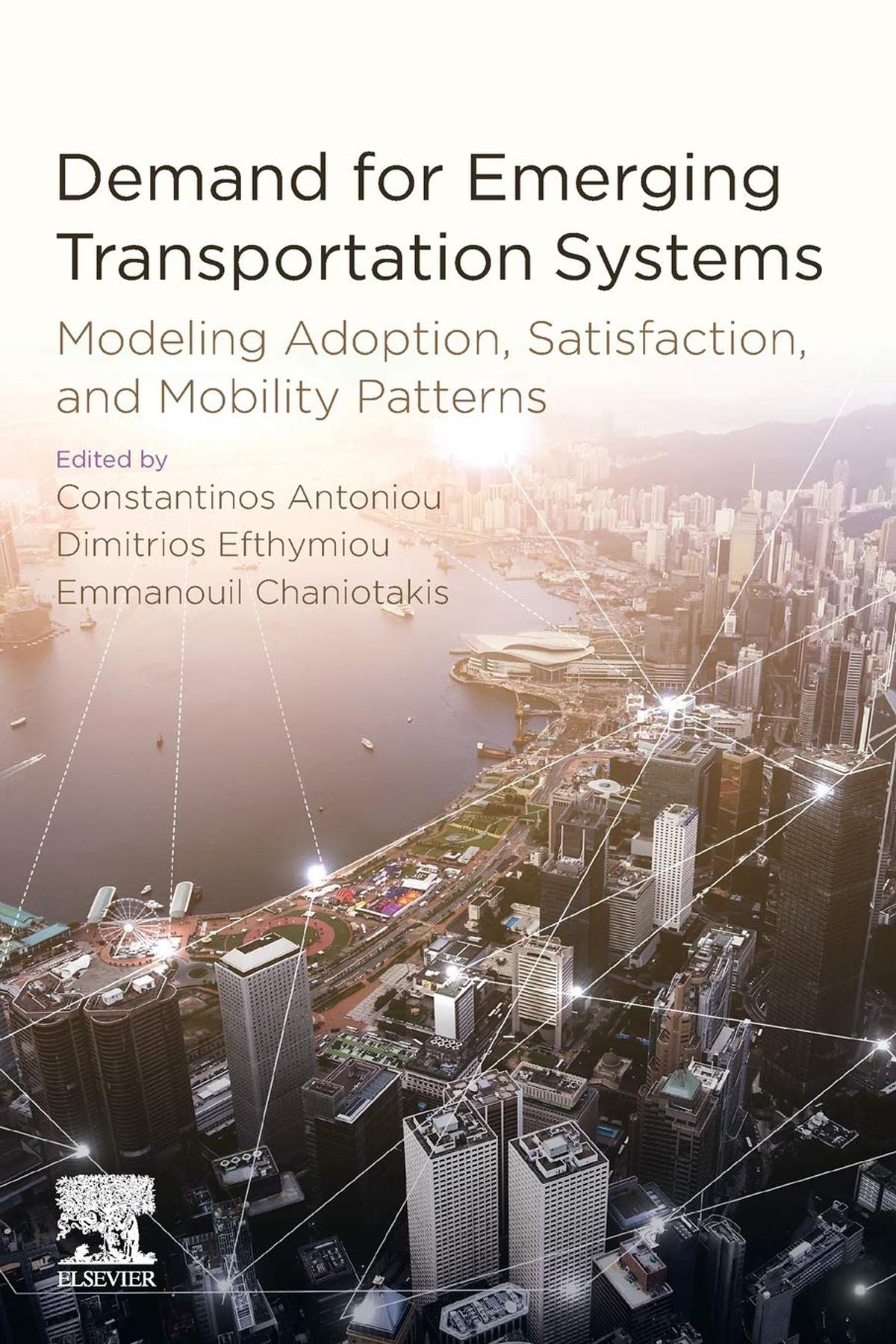Dedication
ConstantinosAntoniou: ToMari-Elen,Maira,HarryandCecilia
DimitriosEfthymiou: ToAlexiaandVasilis
EmmanouilChaniotakis: ToIriniandZoi
Contributors
MayaAbou-Zeid,DepartmentofCivilandEnvironmentalEngineering,American UniversityofBeirut,Lebanon
ArunPrakashAkkinepally,DepartmentofCivilandEnvironmentalEngineering, MassachusettsInstituteofTechnology,Cambridge,MA,UnitedStates
ChristelleAlHaddad,ChairofTransportationSystemsEngineering,Departmentof Civil,GeoandEnvironmentalEngineering,TechnicalUniversityofMunich, Munich,Germany
ConstantinosAntoniou,ChairofTransportationSystemsEngineering,Departmentof Civil,GeoandEnvironmentalEngineering,TechnicalUniversityofMunich, Munich,Germany
BilgeAtasoy,DepartmentofMaritimeandTransportTechnology,DelftUniversityof Technology,Delft,theNetherlands
MosheBen-Akiva,DepartmentofCivilandEnvironmentalEngineering,Massachusetts InstituteofTechnology,Cambridge,MA,UnitedStates
KlausBogenberger,DepartmentofCivilEngineeringandEnvironmentalSciences, BundeswehrUniversityMunich,Bavaria,Germany
EmmanouilChaniotakis,BartlettSchoolofEnvironment,EnergyandResources, UniversityCollegeLondon(UCL),London,UnitedKingdom
FrancescoCiari,PolytechniqueMontre ´ al,Montre ´ al,QC,Canada
AdamCohen,TransportationSustainabilityResearchCenter,UniversityofCalifornia, Berkeley,CA,UnitedStates
DimitriosEfthymiou,ChairofTransportationSystemsEngineering,Departmentof Civil,GeoandEnvironmentalEngineering,TechnicalUniversityofMunich, Munich,Germany
MengyingFu,BauhausLuftfahrte.V.,Taufkirchen,Germany
MaximJanzen,IVT,ETHZurich,Zurich,Switzerland
HarisN.Koutsopoulos,DepartmentofCivilandEnvironmentalEngineering, NortheasternUniversity,Boston,MA,UnitedStates
MasahiroKuwahara,ToyotaMotorCorporation,Toyota,Japan
CarlosLimadeAzevedo,DepartmentofManagementEngineering,Technical UniversityofDenmark,Lyngby,Denmark
DimitrisMilakis,InstituteofTransportResearch,GermanAerospaceCenter(DLR), Berlin,Germany
xiv Contributors
ToshiyukiNakamura,InstituteofInnovationforFutureSociety,NagoyaUniversity, Nagoya,Japan
TomokiNishigaki,DepartmentofUrbanManagement,KyotoUniversity,Kyoto,Japan
RaoulRothfeld,BauhausLuftfahrte.V.,Taufkirchen,Germany;ChairofTransportationSystemsEngineering,DepartmentofCivil,GeoandEnvironmentalEngineering,TechnicalUniversityofMunich,Munich,Germany
Jan-DirkSchmo ¨ cker,DepartmentofUrbanManagement,KyotoUniversity,Kyoto, Japan
StefanSchmo ¨ ller,DepartmentofCivilEngineeringandEnvironmentalSciences, BundeswehrUniversityMunich,Bavaria,Germany
RaviSeshadri,Singapore-MITAllianceforResearchandTechnology(SMART), Singapore
SusanShaheen,TransportationSustainabilityResearchCenter,Universityof California,Berkeley,CA,UnitedStates
AnnaStraubinger,BauhausLuftfahrte.V.,Taufkirchen,Germany
YannisTyrinopoulos,UniversityofWestAttica,DepartmentofCivilEngineering, Athens,Greece
NobuhiroUno,DepartmentofCivilandEarthResourceEngineering,Kyoto University,Kyoto,Japan
BertvanWee,TransportandLogisticsGroup,FacultyofTechnology,Policyand Management,DelftUniversityofTechnology,Delft,TheNetherlands
AkiraYoshioka,ToyotaMotorCorporation,Toyota,Japan
ZhanZhao,DepartmentofCivilandEnvironmentalEngineering,Massachusetts InstituteofTechnology,Cambridge,MA,UnitedStates
JinhuaZhao,DepartmentofUrbanStudiesandPlanning,MassachusettsInstituteof Technology,Cambridge,MA,UnitedStates
FangZhao,Singapore-MITAllianceforResearchandTechnology(SMART), Singapore
CezaryZiemlicki,SENSE,OrangeLabs,Paris,France
Abouttheeditors
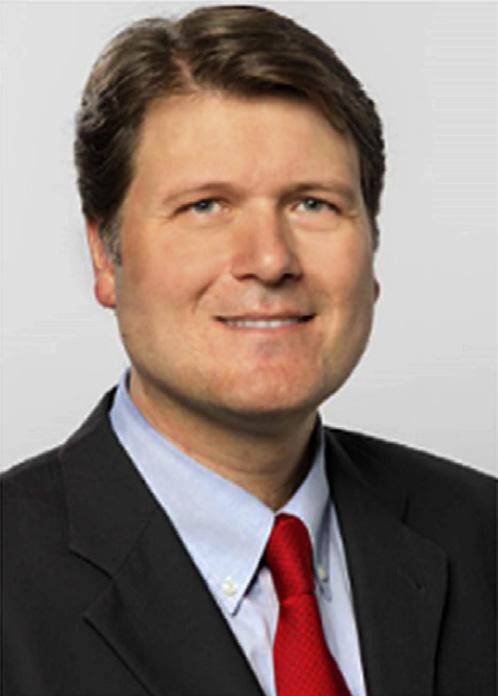
ConstantinosAntoniou isaFullProfessor andtheChairofTransportationSystems EngineeringattheTechnicalUniversityof Munich(TUM),Germany.Heholdsa DiplomainCivilEngineeringfromNTUA (1995),anMSinTransportation(1997)and aPhDinTransportationSystems(2004), bothfromMIT.Hisresearchfocusesonbig dataanalytics,modelingandsimulationof transportationsystems,intelligenttransport systems(ITS),calibrationandoptimization applications,roadsafety,andsustainable transportsystem.Inhis25yearsofexperience,hehasheldkeypositionsina numberofresearchprojectsinEurope,the UnitedStates,andAsia,whilehehasalso participatedinanumberofconsultingprojects.Hehasreceivednumerous awards,includingthe2011IEEEITSOutstandingApplicationAward.Hehas authoredmorethan350scientificpublications,includingmorethan110papersininternational,peer-reviewedjournals(includinginTransportation ResearchPartsA,B,andC,TransportPolicy,AccidentAnalysisandPrevention,andTransportGeography),240ininternationalconferenceproceedings,3books,andmorethan20bookchapters.Heisamemberofseveral professionalandscientificorganizations,editorialboards(Memberofthe EditorialBoardofTransportationResearch PartsAandC,AccidentAnalysisandPrevention, JournalofIntelligentTransportationSystems;Associate editorof EUROJournalofTransportationandLogistics,IETIntelligent TransportationSystems,andTransportationLetters),andcommittees(suchas TRBcommitteesAHB45 TrafficFlowTheoryandCharacteristicsand ABJ70 ArtificialIntelligenceandAdvancedComputingApplications, SteeringCommitteeofhEART TheEuropeanAssociationforResearchin Transportation,FGSVcommittee3.10“Theoreticalfundamentalsofroad traffic"),andafrequentreviewerforalargenumberofscientificjournals, scientificconferences,researchproposals,andscholarships.
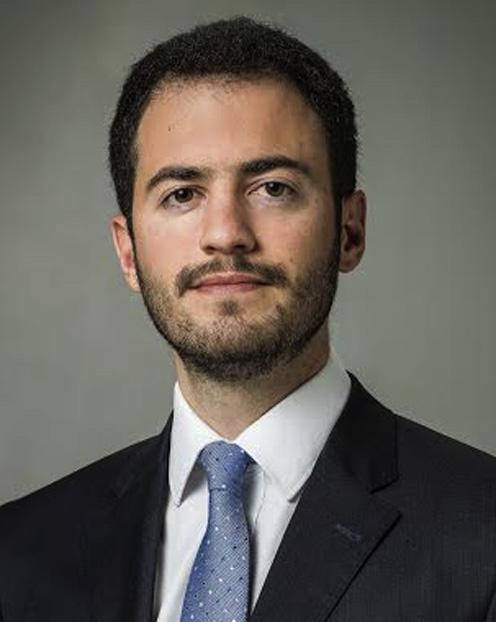
Dimitrios isSeniorProgramManagerat AmazonandResearchAffiliateatTUM. BeforejoiningAmazon,hewasPostdoctoral ResearcherinTransportationSystemsEngineeringatTUMandSeniorConsultantin DataScienceatErnst&Young(EY).He holdsaPhDinTransportationSystems NTUA(2014),anMScandDICinTransport andBusinessManagementfromImperial CollegeandUCL(2010),andaDiplomain RuralandSurveyingEngineeringfrom NTUA(2008).Hisresearchfocuseson modelingtransportationsystems,demand forecasting,spatialeconometricmodels,and machinelearninginTransportation.HehasbeeninvolvedinconsultingprojectsinthefieldsofMobility,Banking,Telecommunications,CPG,and Shipping,andEuropeanandnationalresearchprojects.Hehasauthoredmore than30scientificpublicationsincluding19papersininternationalpeerreviewedjournals(includingElsevier’sTransportationResearchPartA:PolicyandPractice,TransportPolicyandJournalofTransportGeography),29in internationalconferenceproceedings,and2bookchapters.Heismemberof severalprofessionalandscientificorganizations.
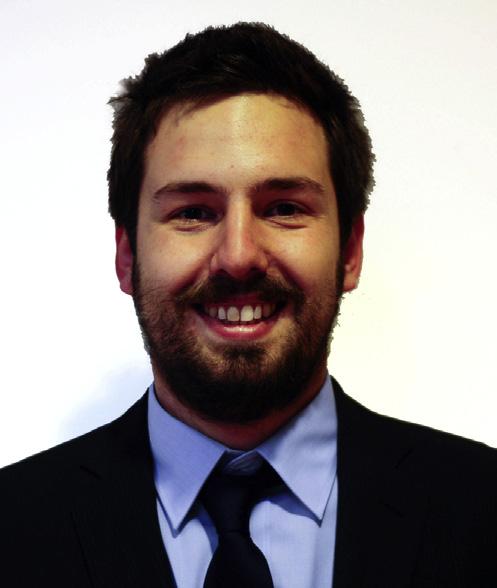
Emmanouil(Manos)Chaniotakis isa Lecturer(AssistantProfessor)atMaaSLab, UCLEnergyInstitute,UniversityCollege London(UCL),UnitedKingdom.Heholdsa diplomainRuralandSurveyingEngineering fromAristotleUniversityofThessaloniki (AUTh),anMScdegreeinTransportation InfrastructureandLogisticsfromDelftUniversityofTechnology(TUDelft),andaPhD fromTechnicalUniversityofMunich (TUM).Hisresearchfocusesonmodeling andsimulationoftransportationsystems, includingconventionalandemergingtransportationsystems,demandmodeling,and machinelearningintransportation.HehasworkedonnumerousEuropeanand nationalprojectsintheareaoftransportmodelingandmachinelearning andhehasbeeninvolvedinconsultingprojectsforestablishmentofstrategic andoperationaltransportmodels,estimationofbehavioralmodelsaswellas theinvestigationofimpactsofnewmobilityservices.Hehasauthoredmore than30scientificpublicationsinpeer-reviewedjournals,conferences,and books.Heisamemberofseveralprofessionalandscientificorganizationsand afrequentreviewerformanyscientificjournalsandconferences.
ConstantinosAntoniou1,EmmanouilChaniotakis2, DimitriosEfthymiou1
1ChairofTransportationSystemsEngineering,DepartmentofCivil,GeoandEnvironmental Engineering,TechnicalUniversityofMunich,Munich,Germany; 2BartlettSchoolofEnvironment, EnergyandResources,UniversityCollegeLondon(UCL),London,UnitedKingdom Chapteroutline
1.Challengesofafast-changing
1.Challengesofafast-changinglandscape
Mobilityisoneofthemostimportantaspectsofhumanactivity,withdirect andindirectimplicationsonthelifeofeveryindividual.Itcanbearguedthat mobilityhasbeenmostlystagnantforthesecondhalfofthe20thcentury,with cars/buses/railandtrucks/railbeingthedominantmodesforpassengerand goodstransport,respectively.Traditionally,inmostplacesaroundtheworld, transportationhavebeencentrallydeveloped,coordinated,andoperatedprimarilybylocalorregionalauthorities,reactingslowlytothechangingneeds. Existingdatacollectionprocessesandmodelingparadigmshavethusbeen adequateinmodelingandoptimizingthesemodes,supportingpolicy-makers andplannersinimprovingthequalityoflifeandminimizingthesocietal impactsofmobility.
Thechangesweobservecanbeencloseduponthe“threerevolutions”: shared,electric,andautomated.Wearecalledtoforecasttheimpactofthese revolutions(e.g.,highlyautomatedvehicles),whenthetechnologyisnotyet here,andthetrajectoriesfortransition(e.g.,fromafullyconventionalvehicle fleettoapartlyorfullyautomatedone)tobeunknownorexpectedtotake manyyears,evendecades.Similarly,othernewmodesappear(anddisappear) atablinkofaneye,withoutpriorinformationornotification,and typically withlittleornoregulationorcoordination(atleastinitially).These
uncertaintiesarenotonlyrelatedtothetechnologicalcharacteristicsandthe capacityofthevehiclesbutalsotothebusinessmodelsthatwillbecome widespread(e.g.,individuallyownedvs.shared).Evenforspecificmodeling extensions(e.g.,modelingautonomousvehicles’impacts),duringthislong transitionperiod,theunderlyingconditionswillbechangingconstantly,thus notleavingtimeforconventionalmodelsto“catch-up.”
Thesituationisexacerbatedwhendealingwithmorevolatilenewmodes. Forexample,Uber(arathernewphenomenon,founded10yearsago)is currentlygenerating14milliontripsdaily,1 whileitsChinesecounterpartDiDi isgenerating30milliontripsdaily.Uberhasextendeditsbusinessmodelfrom singlepassengertripstosharedtrips,whilerecentlydecidedtoalsooffer sharedbicycles,scooters,andevenhelicopterrides(operationstartedinNew YorkCityinMay2019).Respectively,theoBikesharedbikesystemflooded Europeancities(suchasMunichandZurich)in2017,onlytodisappearin 2018,amidprivacyandsidewalk-squattingcomplaints.Similarly,recently inauguratedsharedelectricbicyclesystemsinthenortheasternUSwere shuttered,afewmonthsafterthestartofoperation,duetosafetyconcerns. Whatcomplicatesthesituationevenfurtheristhat,besidesthenatureofthe modes,theirfunding,businessmodel,andownershipstatusvaries,aswell,as theseinitiativesaretypicallynotcontrolledbytheauthorities,butoriginate fromprivatecompanies(rangingfromstart-upstoestablishedentitieslikecar andaircraftmanufacturers).Theuncertaintyisalsogreat,asmanybusiness modelsaretriedatthesametime;e.g.,Airbusisdevelopingalargenumberof differenturbanairmobilityvehiclesinparallel,inordertocoverallpossible outcomes,whileUber(andsimilarcompanieslikeLyftandGrab)alsoexplore differenttypesofservices.
Mobilityofgoodsandpeopleisbecomingincreasinglymoreintertwined andhardertodistinguish.Peopleandpacketsareincreasinglyconsideredas mixeddemandpatterns.Passengerandfreighttransportchainsaregetting increasinglymoreentangled,withthepotentialforsynchronizationandcouse ofinfrastructure,and thus strongsynergiesandbenefits.Theideaisthatas thesamevehiclesandservicescanservethem,anintegratedtransportsystem canemergeonbothademandandasupplyside.Thus,insteadofdeveloping twoparallelsystems,eachbeingunderutilizedforamajorityofthedayand/or space,wecandevelopsystemsthatarecomplementingeachother,bringing alongbenefitsandefficiency.
Anotherbigchangethatisemergingisthemovefromaprimarilyplanebasedtransportationsystem(surface,plussomeundergroundandsome elevatedmodes)intoareallythree-dimensional(3D)situation.Commercialair dronesandurbanairmobility(Fuetal.,2019),aswellasurbanaerialcableways,thatseearevivalofinterest,e.g.,inMunich,butalsounderground
tunnels(e.g.,fromElonMusk’sBoringCompany)andhyperloopconcepts aboveandbelowground,respectively.Thistrendhasthepotentialtoincrease theavailablecapacityandfosterthedevelopmentofadditionalnovelsolutions, butofcoursemakestheapplicationofexistingmodelsverychallenging.
Asitismadeunderstood,thesenewmobilitymodesareemerging(and sometimesdisappearing)inahighpace.Transportationservicesprovisionis nowconsideredaprofitablebusinessoftenattractingstart-upsandotherprivatecompanieswhooperateatrapidpaces,withminimalwarning.The aforementionedexistingmodelingparadigmsarenotsufficientlyagileto respondtotheserapidlychangingconditions,whichoftenproposeand leveragefundamentallynewconcepts,suchasautonomy,connectivity, sharing,andthegig-economy.Theseallconstitutechangesthatrequireusto comeupwithmethodsthatcanfunctionwithinanenvironmentofradical transformationthatcompletelychangesthemobilitylandscape.Thishas immenselyincreasedthecomplexityoftransportationsystemsintermsof
1. Design: Fromaneed-baseddesign,weobserveachangetowardacreating needsprocess,whereemergingmodescompetitionandavailabilitydrives thecreationofadditionaldemand,whichwasnotpresentthelastfew years.Thishasbeenfacilitatedbyanumberoftechnologicaldriverssuch asthewidespreaduseofInformationandCommunicationTechnology (ICT).Thesedriversareessentiallychangingthepotentialofdeveloping transport-relatedservicesandgoodswhileinthesametimecreatingnew datasourcestobeexplored.
2. Coordination: Newactorschangethetraditionallyfollowedprocessesof transportationsystemmanagementandintroducenewandpossiblycontradictoryobjectives(welfarevs.profit).
3. Representation: Theactivitiesofplannershavebeensupportedbya numberofmodels,ofvaryingcharacteristics,includingresolution (microscopicandmacroscopic,butalsomesoscopic,i.e.,models comprisingmicro-andmacroscopiccomponents),butalsocommercial versusopen-sourceorgeneralpurposeversuscustom.Allthesemodels sharedonecommonattribute:rigidfunctionalforms,makingitextremely difficulttoextendandadaptthemtoeffectivelyincorporatingtheemerging modesanddata.Lately,modelingoftransportationsystemsmustdistinguishbetweendifferentformsofprivatecaruse(e.g.,carsharing,ridesharing,andridehailing)andotheremergingmodesoftransport(e.g.,kick scooterandsharedbicycles;autonomousvehicles).Additionally,the modelingparadigmchanges,withdynamicallydefinedsupply,whichis shapeduponthedemanditself(e.g.,availabilityofasharedvehicleinan areaisdefinedbythedemandoftripstothatarea).
4. DataAvailability: “Ifyoucannotmeasureit,youcannotimproveit,”as pertheaphorismattributedtoLordKelvin,andduringthisperiodwehave beenusingalimitedamountofdata(mostlypointdatafromloopdetectors,
andmorerecentlysomelimitedtraveltimeinformation).Duringthelast decade,anavalancheofrich,ubiquitousdataarebecomingincreasingly available,rangingfromsocialmediadatatotelecommunicationdataand fromfloatingcartovehiclestatusdata.
2.Howcanwerespondtothechallengesarising?
Transportationandmobilityplanningneedtobecompletelyrethoughtto leveragechangesinasustainableandflexiblewayforward.Conventionaland newlyemergingmodelingtechniquesshouldbecombinedtobetterunderstand thesituationandevaluatescenariosofwhatthefutureoftransportationwillbe. Attemptstowardthisnewtransportationplanningrealityshouldnotoverlook emergingmodelingtools,emergingdatasources,multiactorsenvironment, rapidinnovationcycles,modelanddatatransferability,aswellasparticipatory planning.
Statisticallearningtechniques(suchasmachineorreinforcementlearning) andflexiblemodelshasbeenfoundtoyieldmoreaccurateresultsinsome cases,suchasshort-termtrafficprediction(Vlahogiannietal.,2005)andcar followingmodels(PapathanasopoulouandAntoniou,2015).Data-driven methodsextendthespectrumofvariablesincludedinananalysispotentially betterrepresentingthetransportationsystem(Dura ´ nRodasetal.,2019). However,allthesenewmodelingtechniquesneedtobecomparedtothe conventionallyusedmethodsasinsomecases,conventionalmethodsare foundtohavebetterpredictionperformance(e.g.,fordiscretechoicemodels, HensherandTon,2000).
CentraltothischangeofmobilityplanningforEmergingTransportation Systemsisthedatausedtopredictaspectsofadoption,satisfaction,anduse. Conventionaldatacollectionandmodelingapproachesareclearlyinsufficient intermsofcapturingtherapidlychangingmobilitylandscapeandrelated changesofgoodsandpassengermobility.Newdatacollectionmethodsare becomingestablished,rangingfromopportunisticsensors,suchasWi-Fiand Bluetoothdetectors,tosmartphone-basedapps[e.g.,FutureMobilitySurveys: Danafetal.(2019);meili: Prelipceanetal.(2018);nervousnet: Pournarasetal. (2015)]thatproviderichinsightsintothemobilitypatterns,butalsotrajectory dataandsatelliteimages(e.g., Efthymiouetal.,2018)and,even,videos.The factthatemergingandfuturetransportationsystemsareinmanycasesunrealized,andtheirexactcharacteristicsareyetunknown,maketheassumptions definedandthedatausedevenmoreimportant.Therecentlyavailabledata sourceshavebeenfoundtoproduceanimmenseamountofdata(Big Data BuckleyandLightman,2015;Chaniotakisetal.,2016;Readesetal., 2007)thatcouldpotentiallybeusedtoimprovetransportationsystems,firstin termsofidentificationandpredictionandsecondofoptimization.Onthesame time,pervasivesystemshaveallowedforseveralsupportingservicestorapidly
emergeandbewidelyused,suchastheconceptsofMobilityasaService (MaaS MatyasandKamargianni,2018)andvehiclesharing.
Thisbookaimsatservingasamediumforunderstandingdemandfor emergingtransportationsystems.Itcriticallyapproachesthepertinentliteratureinordertoestablishthenecessarybackgroundonthemodesthatare typicallyexplored,thefactorsthataffectuseandsatisfactionandtheimplicationsthatemergingmodesbringwithregardstosustainabilityandhuman well-being.Aimingattheestablishmentofasphericalevaluation,aspectsof themethodsanddatacommonlydeployedareexploredandapplicationsare discussed.
3.Structureofthisbook
Thisbookisstructuredinthreemainparts:
PartI:Backgroundandcriticalreviewofthestate-of-the-art.Thispart comprisesthreechaptersprovidingacriticalreviewofthefactorsaffectingthe adoptionofestablishedandemergingmodesingeneral(Chapter2),an analysisofmobilityondemand,withanemphasisonitsinteractionswith publictransport(Chapter3)andaviewontheimplicationsofautomationon accessibilityandsocialinclusion(Chapter4).
PartII:Methods.Thispartcomprisesfourchapters,coveringdataaspects (Chapter5)andmethodologicalcomponentsforlocationplanningforone-way carsharingsystems(Chapter6),aswellastheanalysisofspatiotemporal structuresusingsmartcarddata(Chapter7),andmodellingrequirementsand conceptsforsharedautonomousvehicles(Chapter8).
PartIII:Applications.Thispartcomprisesfivechapters,withkeyapplicationscoveringpublictransport(Chapter9),vehiclesharingadoption (Chapter10),carsharing(Chapter11),smartmobilityplanning(Chapter12), andUrbanairmobility(Chapter13).
Introductoryandconcludingchaptersroundthebookup.
References
Buckley,S.,Lightman,D.,2015.Readyornot,bigdataiscomingtoacity(transportationagency) nearyou.In:TransportationResearchBoard94thAnnualMeeting,number15-5156in TRB2015.
Chaniotakis,E.,Antoniou,C.,Pereira,F.,2016.Mappingsocialmediafortransportationstudies. IEEEIntelligentSystems31(6),64 70.
Danaf,M.,Atasoy,B.,deAzevedo,C.L.,Ding-Mastera,J.,Abou-Zeid,M.,Cox,N.,Zhao,F.,BenAkiva,M.,2019.Context-awarestatedpreferenceswithsmartphone-basedtravelsurveys. JournalofChoiceModelling31,35 50.
Duran-Rodas,D.,Chaniotakis,E.,Antoniou,C.,June2019.BuiltEnvironmentFactorsAffecting BikeSharingRidership:Data-DrivenApproachforMultipleCities. https://doi.org/10.1177/ 0361198119849908.TransportationResearchRecord.
Efthymiou,D.,Antoniou,C.,Siora,E.,Argialas,D.,2018.Modelingtheimpactoflarge-scale transportationinfrastructuredevelopmentonlandcover.TransportationLetters10(1),26 42. Fu,M.,Rothfeld,R.,Antoniou,C.,2019.Exploringpreferencesfortransportationmodesinan urbanairmobilityenvironment:munichcasestudy.TransportationResearchRecord.
Hensher,D.A.,Ton,T.T.,2000.Acomparisonofthepredictivepotentialofartificialneuralnetworksandnestedlogitmodelsforcommutermodechoice.TransportationResearchPartE: LogisticsandTransportationReview36(3),155 172.
Matyas,M.,Kamargianni,M.,2018.ThePotentialofMobilityasaServiceBundlesasaMobility ManagementTool.Transportation.
Papathanasopoulou,V.,Antoniou,C.,2015.Towardsdata-drivencar-followingmodels.TransportationResearchPartC:EmergingTechnologies55,496 509.EngineeringandApplied SciencesOptimization(OPT-i)-ProfessorMatthewG.KarlaftisMemorialIssue. Pournaras,E.,Moise,I.,Helbing,D.,2015.Privacy-preservingubiquitoussocialminingvia modularandcompositionalvirtualsensors.In:2015IEEE29thInternationalConferenceon AdvancedInformationNetworkingandApplications,pp.332 338.
Prelipcean,A.C.,Gidofalvi,G.,Susilo,Y.O.,2018.MEILI:atraveldiarycollection,annotation andautomationsystem.Computers,EnvironmentandUrbanSystems70,24 34.
Reades,J.,Calabrese,F.,Sevtsuk,A.,Ratti,C.,2007.Cellularcensus:explorationsinurbandata collection.PervasiveComputing,IEEE6(3),30 38.
Vlahogianni,E.I.,Karlaftis,M.G.,Golias,J.C.,2005.Optimizedandmeta-optimizedneural networksforshort-termtrafficflowprediction:ageneticapproach.TransportationResearch PartC:EmergingTechnologies13(3),211 234.
Reviewoffactorsaffecting transportationsystems adoptionandsatisfaction
YannisTyrinopoulos1,ConstantinosAntoniou2
1UniversityofWestAttica,DepartmentofCivilEngineering,Athens,Greece; 2Chairof TransportationSystemsEngineering,DepartmentofCivil,GeoandEnvironmentalEngineering, TechnicalUniversityofMunich,Munich,Germany
Chapteroutline
1.Introduction
2.Transportationsystems
2.1Establishedtransportation systems
2.2Emergingtransportation systems 13
2.3Futuretransportationsystems 15
2.3.1Autonomousvehicles 15
2.3.2Urbanairmobility (“flyingtaxis”) 18
2.4Strengthsandweaknessesof thesystemsandmodes examined 19
3.Factorsaffectingtransportation systemsadoptionandsatisfaction 19
3.1Establishedtransportation systems 19
3.1.1Publictransport 19
1.Introduction
3.1.2Demandresponsive transit 20
3.1.3Taxi 21
3.2Emergingtransportation systems 21
3.2.1Carsharing,ridesharing, ridehailing,carpooling, andvanpooling 21
3.2.2Bikesharing 23
3.2.3Sharede-scooters 23
3.3Futuretransportationsystems 24
3.3.1Sharedautonomousvehicles 24
3.3.2Urbanairmobility
Thefactorsthatinfluencetheuseandadoptionoftransportationsystemscan beexaminedfromdifferentstandpoints,suchasorganizational,financial, legislative,technological,anduseracceptance.Allthesedifferentfactorsplay
Another random document with no related content on Scribd:
est in coelis: sic enim persecuti sunt prophetas qui fuerunt ante vos. 'Blessed are ye when they shall revile you and shall persecute you, and shall falsely speak all that is evil against you for My sake: be glad and rejoice, for abundant is your reward in heaven; for so they persecuted the prophets which were before you.'"
The aged man's voice became almost sonorous as he rolled forth the Latin words. He so pronounced the vowels that one thought of bells, some silvern, some of bronze. Most of his hearers had extinguished the lamps and candles which they still held in their hands: but here and there a flame still flickered. Unconsciously they had fallen into such groups and attitudes that the sable monks, with the white and golden Abbot in their midst, might have stepped down from some painted and gilded altar-piece of the fourteenth century. For a brief spell the venerable Abbot continued comforting his children, striving to subdue their worldly anger and to lift their dire trouble to the height of the Cross. He knew the whole of the New Testament by heart, in Latin, and as he had begun his exhortation with words of Saint Peter, he went on quoting from the letters of that apostle only.
"Et quis est qui vobis noceat?" he demanded. "'Who is he that can hurt you?' Humiliamini sub potenti manu Dei, ut vos exaltet in tempore visitationis; omnem sollicitudinem vestram projicientes in eum, quoniam ipsi cura est de vobis. 'Humble yourself under God's mighty hand, that He may exalt you in the time of visitation; casting upon Him all your care, because He careth for you.'"
Growing fatigued at last, he sat down and became fully conscious for the first time of his miter and crozier and cope. Praying Father Isidoro to divest him of this magnificence, he seemed to recover strength again as he faced the fathers clad simply in his habit with a gold cross upon his breast. With the laying aside of his pomps his manner became more intimate and free.
"I have been preparing," he said, "for this blow. The characters of those men who have struck us left me little hope. Dom Pedro's advisers are taking a leaf from the book of the English King Henry the Eighth. They want money so as to carry on a spendthrift government, and they want lands and
great houses so as to create a new aristocracy which will maintain them in power. Therefore the monasteries must be besmirched by false accusations and God must be robbed."
"But, my father, we shall resist," broke out Brother Cypriano, clenching his enormous hands.
The Abbot shook his head sadly.
"No," he said, "there can only be one end. We are men of peace, not of blood. In my weakness and sickness our Lord has seemed to open my eyes to the future. Saint Peter's words might be mine: Certus quod velox est deposito tabernaculi mei secundum quod et Dominus noster Jesus Christus significavit mihi. I am 'certain that the laying down of my tabernacle is at hand, as our Lord Jesus Christ also hath signified to me.' Fathers and brethren, to-morrow will see the end of this community. For more than three hundred years Saint Benedict's children have sought to live by his Holy Rule on this spot; but to-morrow ends all. We can do no more than frustrate the sacrilegious greed of this foreign Visconde and save our patrimony for Portugal."
Taken by themselves the Abbot's words would not have stifled discussion, and even the unconditional obedience they owed to him would not have held back the more militant monks from trying to defeat his will. But the unearthly light in the old man's eyes, which had so terrified the Viscount, beamed forth upon these men like a pillar of fire guiding them in God's way. Even the burly and unmystical Cypriano yielded to the spell. Accordingly no one felt that there was anything dictatorial in the Abbot's procedure when he took their assent for granted and passed quietly on to arrange the details of the community's last hours beneath its historic roofs.
After the Prior, the Cellarer, and two other monks had been consulted, it was agreed that the life of the monastery should proceed as if nothing had happened. Conformably to the Holy Rule, Matins were appointed to be sung at about two o'clock, so that Lauds could follow at break of day. In the order of the monks' Low Masses no alteration was made: but, for the High Mass, the Abbot asked all to pray that he might be given strength to pontificate. As for the inventory, it was decided to adhere to the Abbot's
demands. Finally, the tiny town of Navares, four leagues away, was chosen as the first night's shelter after the exodus. In Navares the Cellarer had a kinsman, a corn-merchant, in whose house and barns some sort of lodgings could be found.
When the Abbot was lain down at last on his hard and narrow bed, the Prior would have had the throng withdraw: but the Abbot forbade him. He wished to speak, he said, to all the fathers and brothers in turn. One by one the monks knelt down beside the bed and kissed the wasted hand with love and reverence; and to each and every one he spoke some word of affectionate encouragement or counsel, and humbly asked their prayers.
Antonio was the last of the choir-monks to come forward. As he knelt down a hush fell upon all. Amidst the general affliction they had lacked time to think of Antonio's bitter trial: but when the Abbot spoke he put the thoughts of all into words.
"Father Antonio," he said, laying his old white hand on the young monk's curling black hair, "may our Lady of Perpetual Succor comfort you. For the present God does not suffer you to say your first Mass. But remember Saint Ignatius of Loyola, who, of his own will, prepared himself for a year before he presumed to offer the holy sacrifice. Your great day will come; and when it shall dawn, I pray you to offer that first Mass for my poor soul and for all who are standing here."
Antonio, deeply moved, was about to rise: but, as he lifted his head, he felt the Abbot's hand suddenly gripping his arm with superhuman strength. At the same time he saw the benign light which had beamed from the old eyes grow brighter and brighter, till the Abbot's whole face was transfigured and glorified. His brethren saw it too; and, by a common impulse, every one of them knelt down on the stones. At last the Abbot's voice began playing upon the tense silence, like an unseen hand on silver strings.
"My son," said the far-away, clear tones. "My son, rejoice. I was wrong. This is not the end. God clears my eyes. Long years must pass away; but I see our chapel swept and garnished. I see Antonio sitting once more in choir, doing the Work of God in his old place. I see him standing before the
high altar. I see him holding up our great chalice. I see him offering the Holy Sacrifice for us all. Rejoice."
He ceased; and while all were still marveling at his prophecy the light quickly faded from the prophet's face. With closed eyes he sank wearily back upon his hard pillow. The Prior made a sign. Father Isidoro and a laybrother remained to tend the sufferer; and, with full hearts and moving lips, the other monks passed out of the chamber one by one.
VThe short night passed without any grave disorder. Indeed, only two light conflicts occurred. During Matins one of Carvalho's guards fell asleep on the floor of the nave, and his unseemly snoring would have hindered the general devotion if the giant Brother Cypriano had not picked up the slumberer and carried him out into the cloister as easily as he would have carried a little child. The other conflict, which was only settled by dragging the captain from his bed at the guest-house, broke out soon after sunrise, when the Brethren entered the sacristy to prepare for serving the Fathers' Masses. At first Carvalho and his men stoutly refused to allow a single chalice or paten or vestment to be brought out of the drawers and cupboards: but the Prior had stood by the community's rights and the captain gave way.
Never before, in the oldest monk's memory, had the Hours been so fervently recited. Words which had become trite through thousands of repetitions glowed again with timely meaning. For instance, at the beginning of Matins, the verse "O God, incline unto mine aid, O Lord make haste to help me" burst forth with passionate entreaty. The same thought was in every mind. In ten hours it would be noon: the Lord must make haste indeed. As for the Lord's Prayer every clause of it searched the monks' hearts. God's kingdom seemed to be departing: but they said, "Thy kingdom come." With food and shelter both uncertain they pleaded, "Give us this day
our daily bread." The squat Viscount's greedy face rose up before them all: yet they strove after sincerity when they said, "As we forgive them that trespass against us." As directed by the Holy Rule this petition was breathed silently: but it was aloud that they cried, "Deliver us from evil."
Despite their exaltation and their quickened faith, all were amazed when the Abbot sent word that their loving prayers had been answered and that he felt strong enough to pontificate at the High Mass. After Prime he called Antonio to his cell that he might speak with him alone. When the door was shut the young priest was about to kneel: but the Abbot prevented him.
"Rather," he said, speaking with the utmost solemnity, "ought I to kneel, Father Antonio, to you. God and our holy father Saint Benedict have called you to a glorious work. It is yours to lead our Order back to this place. But not yet. Be patient. Be humble. Be prudent. Keep your own counsel. Wait for the guidance of God."
Antonio's heart glowed like a live coal within him.
"Whither God shall guide you I do not know," the Abbot continued. "Perhaps through dark and stony places. It may even be that for long years you will be unable to exercise your priesthood and to follow up your religious life. But, if such should be His trial of you, remember this. Our blessed Lord Himself did not break the Bread and take the Cup until the night before He died. Go in peace."
Throughout the High Mass the flame burned ever more and more hotly in Antonio's breast. He seemed, like Saint Teresa, to have the very stuff of his heart on fire. From the Introit to the Communion he duly sang every note that belonged to his duty; but, as the sacred mysteries proceeded, he felt as if only his body remained on the earth, and that his spirit was dwelling with the Abbot's in a supernal world of pure ecstasy.
The Viscount, the captain, and half the soldiers were present at the Mass, some of them assisting with devotion. They salved their consciences by reminding themselves that the Almighty was more powerful than the Government in Lisbon, and that He could be left to look after His own business. As for the Viscount and the captain, in some amazing fashion they
had made up their quarrel of the night before, and it was evident that a mysterious understanding existed between them. As the Mass neared its close their nervousness could not be concealed. After all, the soldiers were Catholics; for even the most irreligious of them would not wish to die without a priest. The Viscount repeatedly whispered to the captain his fear that the Abbot was meditating a coup, and that he would suddenly win a strong bodyguard to his defense by threatening the despoilers with excommunication.
After the last gospel the Abbot advanced and stood leaning on his crozier. The Viscount went very red; the captain nearly white. But the bolt did not fall. In solemn tones the venerable man simply repeated the words of Jeremias:
"Hereditas nostra versa est ad alienos; domus nostrae ad extraneos."*
* "Our inheritance is turned to aliens; our houses to strangers."
After a long pause he stretched out a fatherly hand and pleaded in the words of Saint Peter:
"Et ipsi tamquam lapides vivi superaedificamini, domus spiritualis, sacerdotium sanctum, offerre spirituales hostias acceptabiles Deo per Jesum Christum."*
* "Be ye also as living stones built up, a spiritual house, a holy priesthood, to offer up spiritual sacrifices, acceptable to God by Jesus Christ "
That was all. But it was too much for the Viscount and the captain. The captain's Latin was restricted to a confused recollection of an assertion of
Julius Cæsar's to the effect that all Gaul is divided into three parts, while the Viscount, who fully believed that nil meant "never," knew the single phrase Nil desperandum. Accordingly, as the Abbot retired to make his thanksgiving, they laid their puzzled heads together, wondering what secret words of command he had spoken to his followers.
It was five minutes to eleven.
"You saw that chalice?" whispered the Viscount. "There's another like it, only bigger. The rubies are from India. They're Burmese. They came through Goa from the hoard of some Indian king or other. I know their whole history."
He was developing a humbugging tale about the difficulty of marketing large rubies for their full value when a gong-like sound, rich and deep, stopped him short. It was the great bell of the abbey which had been ungeared during the Abbot's illness. Ten more strokes slowly followed.
"Eleven o'clock," said the captain. But nothing happened and nobody appeared. The Viscount and he exchanged nervous glances.
A minute later Carvalho entered and announced that the community was assembled, with the Abbot at its head, in the paved space which fronted the chapel. The captain at once ordered that all the soldiers, save the sacristy guards, should fall in and attend him on the same spot.
At five minutes past eleven Carvalho's words of command had ceased echoing through the cloisters, and the men's heels were already resounding on the stones outside. Some one threw open the western doors of the chapel, and a wave of warm air, heavy with the scent of orange-blossom, surged into the cool dimness to mingle itself with the lingering fragrance of the incense. The captain looked out. He could see the monks, all in black, drawn up in two lines behind the Abbot, and, facing them, his own troopers, dismounted and unkempt. The captain strode forth boldly into the bright sunshine, and the Abbot came forward a step to meet him. It was like an encounter of two old-world champions for single combat, with their little armies looking on. They exchanged salutations punctiliously.
As the Viscount pottered up in the captain's rear the Prior took a place beside the Abbot, and began to speak in such far-ringing tones that the soldiers twenty yards away could hear every syllable.
"His most illustrious Reverence the Lord Abbot," he said, "charges me to give your Excellencies his answer and the answer of this community. We cannot give up these holy places either to Portugal or to any man within her borders: because they are not ours to give. If we must abandon our patrimony for a while, we shall do so under protest against this robbing of God and of the faithful departed. But there are limits to our meekness. We are Portuguese men as well as Catholic monks, and we shall not surrender this abbey to your Excellencies until the inventory has been signed and delivered."
To the consternation of the more aged and timid monks the captain made a gesture of scorn. All his words and actions the night before had encouraged them to hope that he would prove their stanchest ally against the Viscount. They did not know and could not guess that he had bartered away the remains of his honor for a promise of twelve hundred and fifty English pounds.
"And if we refuse?" he said. "If the noble Viscount and I refuse; if no inventory is signed or delivered: then what will your Worships do?"
The Prior answered promptly and firmly:
"We will see to it that your Excellencies do not rob their masters on earth as well as their Master in heaven. We will see to it that your Excellencies, as well as ourselves, obey this decree. Portugal shall not be cheated. Let the inventory be signed and we will go forth without strife to regain our rights elsewhere. Peace is our watchword, and we are vowed to poverty. But let your Excellencies refuse—"
He made a long pause, and only when the suspense had become intolerable did he add in ringing tones:
"Then these brave men who have bled for Portugal will do their duty. They are not hirelings: they are volunteers and patriots. Senhor captain, do
not deceive yourself. Men are not born in cowls. Under Wellington I led Portuguese troops into fourteen battles. Your men love Portugal, and they do not hate God. I have only to give the word and more than half of them will be mine. Here is the inventory and here are pens and ink. Your Excellencies will verify it—and sign."
Two lay brethren approached carrying a deal table, upon which Father Sebastian laid two copies of the inventory, an earthenware inkstand and a bundle of goose-quills. At the same time Brother Cypriano bore forward a carved chair, in which the Abbot sat down.
Ungovernable rage set fire to the captain's wits at the very moment when he needed all his coolness. He had sold his soul and his country for gold which, after all, he was not to receive. He turned savagely towards his seducer, and saw with disgust that the Viscount, whose sense of dignity was nearly as small as his sense of humor, had opened a vast umbrella.
"What are we to do?" the
captain rapped out.
"Do? We refuse, of course. It's all bravado. Leave them to me. I will answer."
He turned to the Prior with a ridiculous air of importance and shut up his umbrella. But before he could speak a word the guffaw which had so much disconcerted and offended him the night before in the vestibule broke again from one of the soldiers. As the Prior had said, these men were not mercenaries. Their ranks comprised a salt-winner from Aveiro, the two sons of a Lisbon saddler, a fisherman from Figueira da Foz, two quarrymen from the Minho, and a score or so of peasants from the Beiras: but one and all of them had something of the fidalgo in his air, and one and all of them was dimly conscious of the upstart Viscount's low breeding.
The guffaw was not the worst. Although the troopers still stood at attention, the captain's sharp ears detected mutterings and whisperings. During the morning the men had debated among themselves the motives of the Viscount for risking his neck on horseback in order to do work which pertained to a sheriff's officer, and they had decided that the Abbot's demand was prudent, patriotic and just. Again, the hospitality of the
Cellarer, the impressive rites in the chapel, and, above all, the holiness of the Abbot had increased their distaste for the work they were come to do.
"Our final word—" began the Viscount, pitching high his tin-whistle voice. But the captain came to his senses in time. He seized the little man's fat arm angrily and hissed in his ear:
"You cursed fool, be quiet. Wait." And, in a loud voice, he said to the Prior, "I will sign."
A cheer from the soldiers greeted his words. Then, so that they might verify the treasures detailed in the inventory, the Prior conducted his glowering visitors to the sacristy. The Blessed Sacrament had already been removed: but he seemed to shrink from polluting the chapel with their presence, and therefore he chose a roundabout route. Passing through the cloisters he led the way through the kitchen.
As he entered the lofty room the Viscount, despite his chagrin, could not repress a cry of admiration. A dado of blue and white tiles ran all round to a height of six feet; and, above, the lime-washed walls were as white as the purest snow, save where the word Pax had been painted upon them in shapely letters of blue. Above the fireplace, which was in the middle of the room, rose a canopy of burnished copper, so elongated that it pierced the vaulted roof. This was the chimney. But the great surprise was a rivulet of clear water which rushed down a stone channel the whole length of the room. Centuries before, the monks had diverted a mountain stream from its bed, and ever since, night and day, winter and summer, the cheerful waters had gone on leaping and singing through the great white hall. Near its egress, at the north-west corner of the kitchen, the rivulet ran through a square frame of perforated boards. Like a similar contrivance in the vast and famous abbey of Alcobaça this frame formed a place of storage for a few freshwater fish, so that the refectory tables should not go unfurnished even when the Atlantic storms kept the monks' boat idle.
But the Prior was not in a mood to act as cicerone to sightseers, and he strode on until the sacristy was reached. Carvalho's guards were at their posts, and they had been joined by four monks who had come directly through the chapel. Among them were Sebastian and Antonio.
The sacristy was dustless and spotless; and when the cupboards were opened every inch of embroidery and every ounce of plate were found in their places as described in the inventory. At the sight of the gold and silver and precious stones the Viscount's eyes glittered like glass beads. He would have taken the holy vessels in his fat hands to fondle them had not the Prior sternly repelled him. By way of revenge, as well as to mislead the captain, the Viscount then set himself to depreciate everything. The triptych was not Limoges, and he had his doubts about the rubies. The vestments were falling to pieces. As for the Gran Vasco, who was Gran Vasco, after all? He was a painter whom not one collector in a thousand had ever heard of. Besides, the painting was certainly a copy.
To these remarks the Prior did not pay the smallest heed. When everything had been verified, he kissed with exceeding reverence a reliquary containing the relics of martyrs who had suffered for the Church. Then he replaced this last treasure on its shelf and locked the cupboard. The captain held out his hand for the keys, but the Prior answered:
"After you have signed, Senhor Captain. At noon. Till then your guards are keys enough."
Together with the four monks he quitted the sacristy, leaving the two men to follow. But they lingered. To get out of earshot of the guards the captain drew the Viscount into the chapel, and muttered hurriedly:
"We sign. Then we pack up the stuff and bury it. To-night we send to the Government a report. We tell them how these fellows threatened resistance and tried to win over my soldiers. We tell them how the Abbot is an old miser doting on the gold and silver; that we fear a raid of their sympathizers in force; and that we have thought it wise to bury the treasure. We ask them to send a lock-up van and twenty more men to bring it away. And meanwhile..."
"Yes. Meanwhile..." repeated the Viscount, beaming and chuckling. "Meanwhile... By the way, you see these tiles on the walls?"
Yes, the captain saw them. The walls of the oblong nave were almost entirely clothed with azulejos, or blue-and-white tiles. The multitudinous
squares formed large pictures crowded with life-size figures.
"If we could get them down some day from the walls," murmured the Viscount, "I know an Englishman who would pay a thousand pounds for them."
He was interrupted by Brother Cypriano, who demanded in a peremptory tone:
"How much longer are we to wait for your Excellencies?"
They did not return through the kitchen and cloister, but followed Brother Cypriano out of the chapel directly into the paved space. The captain looked haggard, but the Viscount was radiant.
"The keys are here?" he asked. "Good. Then give me a pen."
Forgetting himself in his elation, he began to sign the name of his humble days: but he quickly scratched out the half-written word and substituted his grandiose signature as Visconde de Ponte Quebrada. Then he handed the quill to the morose captain, who slowly subscribed his name.
"There!" cried the Viscount, picking up the great iron keys of the abbey and the small steel keys of the sacristy cupboard. "Now I hope everybody is satisfied. I wish your Reverences a pleasant journey."
VI
The big bell banged noon. In front of the chapel Saint Benedict's heavyhearted sons were ready to depart. Only Brother Cypriano was absent.
No one stirred. The captain glanced round with new anxiety. But his suspense did not last long. A lighter bell smote through the dull resoundings of the great gong. It was Brother Cypriano ringing the Angelus. With bowed
heads the monks repeated the Angelic Salutation. The soldiers and the captain uncovered: and, with an awkward grab at the brim of his sombrero, even the Viscount made a show of following their example.
This last act of faith being ended, the Abbot made a sign, and two of the brethren approached him with a litter. The old man's miraculous tide of vitality was ebbing as fast as it had flowed, and the captain knew that, in the circumstances, the Minister in Lisbon would not approve of this indecent haste. But he had involved himself too deeply with the Viscount to draw back, and it was essential to his plans that the whole monastic garrison should vacate their barracks without delay. Therefore he contented himself with uttering a string of regrets which nobody heeded.
It was a quarter-past twelve when the procession started. The monks went forth two and two, like the Seventy in the gospel. At their head walked the Prior and the Cellarer, who had much to discuss concerning ways and means. The Abbot's litter was borne at first by Father Isidore and Father Antonio. Brother Cypriano and the other lay-monks brought up the rear. They led five pack-mules, whose burdens contained little more than the monks' winter shoes and habits, and a blanket for each one. The Prior had not asked leave to take either the mules or their loads, but the captain had not raised any objection. As for their personal belongings, the fathers and brethren seemed to be almost literally fulfilling the Holy Rule, and to be carrying away almost nothing of their own. Each monk held a small bundle, in which the four volumes of his breviary were the principal item.
They wound down the paved way without looking back. The Viscount grinned and rubbed his hands. Soon the black files were lost to sight in the avenue of camellias, and a few minutes afterwards the strident grinding of iron on iron proclaimed their arrival at the rusty gate.
The captain gave a signal to Carvalho, whose men had been busy saddling their horses, and immediately a detachment twenty strong cantered after the exiles.
"A guard of honor," chuckled the Viscount.
"I am obeying the Minister's instructions," answered the captain dryly.
"Like a good boy. And at the same time you've got rid of half these prying peasants. But come, we haven't sampled the cellar. And I could eat a couple of those fat trout."
The captain flung aside his uncomfortable thoughts and agreed, with an oath, to a carouse. The pair plunged into the cool corridors, to ransack the larder with small success.
Meanwhile the unpitiful sun was beating on the monks' heads and on the Abbot's rude litter. The cruel ball of fire hung in a dome of so hard a blue that it might have been cut from one immense sapphire. The Atlantic chafed in its bed with a simmering sound, and blinded the eyes like molten copper.
Carvalho and his troopers, who had been hanging on the monks' rear, were the first to surrender. Riding forward to the head of the train, Carvalho in person suggested that both drivers and driven should encamp amicably in a neighboring grove of eucalyptus until the fiercest heat had passed. The Prior agreed.
Of all the eucalyptus groves in Portugal, the grove which the travelers entered was one of the oldest and most grandly grown. Just above it a small pine wood offered a deeper and cooler shade, and a rapid brook made the oasis complete. Almost immediately some of the soldiers began to fraternize with the monks, pressing upon them dark broas baked from maize and rye, and handing round the wine-skins. The monks, in their turn, offered salt fish, which the soldiers joyfully ate quite raw. After the repast the soldiers flung themselves down full length to sleep upon the pineneedles; and although the monks produced their breviaries and tried to say the Office, ere long most of them succumbed to drowsiness.
Antonio was wide awake. His share of the frail old Abbot's weight had seemed not much more than a feather to his youthful strength. He looked round. The mules and horses were browsing happily in the lush herbage. Carvalho and a corporal were spelling out some papers in low tones. The Cellarer and the Prior were equally engrossed in writing and figuring. Under the densest pine tree Father Isidore and Father Sebastian were keeping vigil over the sleeping Abbot.
The young monk sauntered eastward, following up the course of the stream. He suspected that its dancing waters were those which had flowed through the monastery kitchen, and a few minutes' breasting of the pinecrowded slope proved that he was right. From the top of the knoll he could make out the dazzling white front of the chapel, framed in dark granite, and he could hear the dull boom of the great bell striking two o'clock.
At the foot of the knoll, half hidden in verdure, some dilapidated buildings huddled on the banks of the rivulet. He descended to explore them. The windows of the little house were broken, and weeds choked the garden. There were also two barns, raised on stone pillars to thwart the rats, a byre, a threshing floor, and a little orangery in full blossom. Apparently many years had slipped by since the place was inhabited.
Having satisfied his curiosity Antonio was turning away when a thought struck him. He approached the buildings again and examined them much more closely. Then he took his resolution. With his eyes fixed on the glittering white chapel, which shone down upon him like the Bride of the Lamb, he knelt in the long grass and repeated the Benedictine prayer, Excita Domine. His prayer done, he remained a few minutes in meditation before he sought his brethren.
Regaining the knoll's top and beginning to descend, Antonio found that the scene had changed for the worse. The attitudes of some of his drowsy companions were neither dignified nor picturesque. They were wearing their worst tunics for the journey, and the grey dust from the road did not improve the rusty black of the garments. Their bundles looked untidy and paltry. More disenchanting still, some of the monks who were still awake seemed to have descended from their exaltation and to be sourly grumbling together over their misfortunes; while the faces of the Prior and the Cellarer shewed that they were still deeply debating the community's creaturecomforts.
For a moment Antonio's enthusiastic faith was shocked and chilled. Was this cause worthy, after all, of the bitter sacrifice he had resolved to make? But his doubt vanished in an instant in the light of a thought which came to him as if from heaven. He thought of the great flights, the great martyrdoms, and understood that if he could have been a looker-on at them
all, he would have seen the jewel of faithful love shining out from a dull alloy. Saint Benedict's flight from Subiaco to Monte Cassino, the martyrdom of Saint Laurence—no doubt even these holy happenings had had their ugly elements, their sordid accompaniments. Their realities did not correspond with the idealized versions of stately altar-pieces, and stained glass, and illuminated parchments, and statuary. More: he reminded himself that, according to human standards, even his divine Master had passed poorly from a mean birth to a base death. He recalled the words of Isaias, Non est species ei, neque decor; et vidimus eum et non erat aspectus et desideravimus eum: "There is no beauty in him nor comeliness; and we have seen him, and there was no sightliness that we should desire him."
VII
Two miles outside Navares a hurrying horseman almost collided with the head of the monks' procession. He turned out to be a courier from Lisbon with an urgent letter for the Prior.
Pleased to be spared the rest of the journey to the monastery, and still better pleased with the broad coin which the Cellarer gave him from the community's scanty purse, the messenger delivered his package and was about to set his horse's head homewards, without inquiring what the monks' exodus might mean, when Carvalho bade him halt.
"Your Reverence," said Carvalho to the Prior none too respectfully, "I have no orders to stop letters, but I have positive orders that your Reverences must not attempt to harangue the people of Navares. And I have further orders that your Reverences must not remain in Navares beyond noon to-morrow. I am to conduct all who wish it to Lisbon, where the Government will settle the matter of the pensions of your Reverences as soon as possible."
He showed the Prior two more sheets from the Viscount's inexhaustible store of papers in support of his announcement. For a moment the Prior lost his self-control.
"Cur!" he said.
Carvalho bowed, with the scornful smile of borrowed power towards fallen greatness, and rode off to dispose his men in two extended files, which could, if necessary, envelop the monks completely. The Prior also went back along the line, briefly telling the news to each pair of monks and bidding them be ready for a council in their lodging at Navares.
As the Cellarer's kinsman, the Navares corn-merchant, lived on the outskirts of the town, the shelter of his house was gained before news of the monks' arrival had reached the townspeople. The corn-merchant was a convinced Liberal, and something of an anti-clerical: but he received the Cellarer's brethren with hearty sympathy and lavish hospitality. He gave up to the Abbot his own room. The beds of clean straw which he caused to be made along the whole length of a newly lime-washed granary were softer than the mattresses at the monastery, and his supper of soup and salt fish and cheese and wine was appetizing and abundant. Perhaps his best deed, however, was his expulsion of Carvalho and the corporal, who coolly walked into the granary so as to listen to the monks' discussions.
"Very well," shouted Carvalho after the Cellarer had convinced him that his precious papers gave him no right to violate a private domicile, "I go: but I forbid their Reverences to hold any kind of assembly."
"Their Reverences," retorted the corn-merchant, who feared man even less than he feared God, "will do as they please so long as they are in my house. As for your Worship, he will kindly walk out of it."
After supper the council began. Veni Creator Spiritus was sung. Then the Prior rose, with the letter from Lisbon in his hand, and said.
"Dear Fathers and Brethren. God help us to bear our many sorrows. The courier has brought bad news.
"For some reason, which the Visconde de Ponte Quebrada could explain, our house was the first to be seized. But before many days have passed the spoilers will possess themselves of all the houses of our Order. We are forbidden to take counsel with any other community of outcast religious, or to establish ourselves in new houses. Without God's help this is the end of the Portuguese Benedictine congregation.
"From man we have nothing to hope. The Government is one of bad faith. In my hand I have the proofs that the earlier laws of this Spring were shams. All the time it was intended to suppress the Orders entirely: but the Government dared not let the people see the thick end of the wedge. They have revealed it at last with fear and trembling. Their Bill was fathered upon one Minister alone, the Senhor Joaquim d'Aguiar. It was arranged that, in the event of public indignation, the other Ministers were to repudiate openly both the Senhor d'Aguiar and his Bill, although, in secret, it was their joint act and deed. Portugal is being governed in a poisonous mist of tricks and lies.
"But why does the Portuguese people suffer God to be robbed and His servants thrown into the highway without crowding to the rescue? Alas, dear Fathers and Brethren, I know the answer. Our poor land is sick of war: but there is a deeper reason why even the most fervent Catholics will not unsheath the sword again in our defense. Dom Miguel deceived them. Just as Dom Pedro has made a sham of Liberalism, so Dom Miguel has made a sham of piety. Dom Miguel raised the cry of 'Throne and Altar.' But he cared only for the Throne. If Saint Michael and all the angels should descend to earth in our defense, the Catholics of Portugal might join their banners: but the Portuguese Catholics will not believe again in any merely human leader. They remember Evora Monte.
"More: in many lands this tyranny and treachery of the Government will be applauded and upheld. Many lands have lent the Emperor Pedro money, and they claim the right to influence him in secret. The Protestants of England will rejoice in our downfall because we are Catholics and monks: the atheists and Jews of France and the Low Countries because we are Christians. The oppression of monks will spread. Spain, France, even Italy,
will suffer. Pater dimitte illis; non enim sciunt quid faciunt: 'Father, forgive them; they know not what they do.'"
The long room was growing dimmer while the Prior was speaking, and when he had finished he could hardly see the features of his auditors. For two or three long minutes silence blended itself with the dusk. The livelierminded among the monks sat still because they felt that the Prior's words were all too true, while the simpler souls were cowed and hushed by the splintering of their last props of hope.
The Prior, not wishing to impose his bare opinions upon the community, went to the window and read aloud the long and clear letter from Lisbon which a devout layman had made so much haste to despatch. At the end of his reading he called for candles; and, as soon as they were brought, he threw the council open.
No one spoke. All eyes were fixed on Antonio, all ears were waiting for his words. Amidst the prosaic discomforts of their hot march the monks had seen the young priest merely as one more dusty and perspiring exile: but, after the speech of the Prior, they recovered some of the mood in which they had listened to the Abbot's prophecy the night before. The scene had a solemnity of its own. Instead of carved stalls the monks sat on boxes, casks, and heaps of straw: but the few candles, casting vague shadows of blackrobed figures upon the death-white walls, filled the mind with bodings of supernatural mystery. One and all gazed upon Antonio's face, fully persuaded that he would speak and ready to obey.
Antonio, becoming conscious of their expectation, flushed and fastened his eyes upon the ground. The Prior, putting into words the general feeling, said gently:
"Father Antonio, be not afraid. What said our Father Saint Benedict in the Holy Rule? Ideo autem omnes ad consilium vocari diximus; quia saepe juniori Dominus revelat quod melius est: 'We have ordained that all be called to Council, because it is often to the youngest that God revealeth what is best.' Speak."
The Prior's words, the intent looks of his brethren, the shadows, the candle-flames, the silence, seemed to Antonio like so many hands, great and small, held out hungrily for his words. Besides, was it not disloyal, mean, unbrotherly, to lock away a secret from his brethren? At this thought the hands came searching and plucking in his very breast. But the heavenly light, which had been burning like a bright lamp within him all day long, once more showed him his duty. He knew that among the monks were old men of enfeebled mind and weakened will, whose worn wits would not be proof against the artful pryings and questionings of spies, and that he had no right to burden them with a secret they could not keep. Yet this was a minor consideration. The supreme fact was that God was saying to him, "Hold thy peace."
Only when the silence had become unbearable did Antonio answer:
"Father Prior, indulge me. If I must speak, I crave leave to speak last."
As affectation and false humility were faults which had long been cast out of the community, the Prior reluctantly took Antonio at his word. Indeed, there was that in the young priest's voice which compelled the acquiescence of all.
"Then let us, Fathers and Brethren," said the Prior at length, "speak in turn. I will begin. But all I shall say is subject to alteration, nay, perhaps to complete reversal, by the council Father Antonio shall give us."
A low murmur of approval rounded off his words.
"My own council," continued the Prior, "would be this. The Father Cellarer knows to a vintem how much money we can find. Let us, for the present, turn our cheek to the smiter and abandon our community life. Let each of us decide where and how he can best live till we have bettered or worsened our case in Lisbon, and let him declare to the Father Cellarer what money he will need. For the present Father Isidoro and Brother Cypriano and I will remain here with our beloved Father Abbot. He believes"—here the Prior's voice trembled—"that God will call his soul away to-morrow; and it is not for us to say 'God forbid.' But be it tomorrow, or next week, or next month, or next year, here we stay, Father
Isidoro, Brother Cypriano and I, even though all the horses and men in Portugal be sent to move us. And, when we have laid our beloved Father's remains in the earth, I will join the Father Cellarer in Lisbon. We shall live in the house of the writer of this letter, the Senhor Aureliano Gonçalves de Sousa, the notary, in the Rua Augusta. Let every one of us keep in touch, one with another, at that address until our future is clearly known."
The Cellarer spoke in the same sense. He was followed by the monks in turn. Every one of them, with varying degrees of conviction, repeated the Prior's saving clause about Antonio's coming words, and every one of them endorsed the Prior's counsel.
Father Isidoro and seven other choir-monks added that their refuge would be in a house of their Order on Spanish soil, just across the Guadiana. It appeared that they had been discussing the matter all day, and that they had fixed upon this particular Spanish monastery because it was within two hours' ride of Portugal. Father Sebastian announced that he would take shelter at the Inglezinhos in Lisbon. These English Fathers, he said, could not be suppressed because they were secular priests and British subjects: but they had a cloister and something of community life. Other monks spoke of Vigo, of Santiago de Compostela, of Salamanca, and of a new house in Belgium where there was a strict observance. Two dreamed of Monte Cassino itself, and one surprised the Council by mentioning a Benedictine house in Protestant England, not far from legendary Glastonbury. Some of the oldest Fathers named friends, clerical and lay, in various cities of Portugal, beneath whose roofs they could die quietly if the Prior's and the Cellarer's fight in Lisbon should end in defeat. As for the lay-brethren, they decided to go in a body to Evora, where Brother Lorenzo had claims on the protection of the Archbishop.
It was inevitable that these announcements should generate in the Council an unmonkish excitement. After having been so long persuaded that they would live the rest of their lives and die their due deaths within the same square mile of earth, there was something strangely fascinating in this sudden unrolling of the map of Europe. The solid sorrow of their dispossession was almost hidden for the moment under a whirl and flutter of little arrangements; even as a fatal reef is hidden under the pretty spray
of the rollers it has smashed to glittering atoms. The buzz of talk which followed on the more formal speaking was not without the shrill note of schoolboys as they discuss a thousand plans for an approaching holiday.
The Cellarer who, despite his preoccupation with its temporals, was one of the community's most spiritually-minded members, swiftly detected the danger.
"Father Prior," he said loudly, "all have spoken save Father Antonio."
His bright firm voice cut through the dull buzz like an eagle dashing through starlings, scattering them all in flight. Every monk felt the just rebuke, and once more there was silence.
"Father Antonio," said the Prior, quietly and kindly.
Antonio felt that he could not speak from his place by the wall. He rose and advanced with bowed head into the midst of his brethren. The cornmerchant's tiny candles were flickering down into their sockets; and he waited a few moments in the hope that darkness might enveil him before he opened his mouth. But the lights leaped into fuller brightness. He raised his head. Everywhere he saw eyes, eyes—old eyes and young eyes, loving eyes and stern eyes, dull eyes and eager eyes, hopeful eyes and fearful eyes— everywhere eyes, eyes fixed on him, Antonio, alone.
"Father Prior—" he began. But his prepared words were taken away. The eyes went on piercing him until he felt like the holy martyr Sebastian in the midst of the sharp arrows. At last words burst from him.
"My Fathers, my Brethren," he cried. "Forgive me. To-morrow I am going back into the world."
One of the lights went out suddenly, as if Antonio's apostasy had struck it down like a blow. But for five or six seconds no one stirred or spoke. A second candle-flame leaped up and died away. Then, in the dimness, uprose a confused murmuring, sharpened here and there by exclamations of scorn or anger or bitter sorrow. More distinctly than the rest was heard the garrulous contempt of Father Bernardo, whose lapses into the sin of
gluttony had so often scandalized the brethren. Father Bernardo's righteous scorn was sincere. He had no vocation to be a saint or a hero himself; but he knew that saints and heroes were necessary, and he despised Antonio for turning his back upon the light.
The Cellarer left his seat and came to Antonio's side. Isidore and Sebastian followed him, and other monks showed signs of doing the same. But before a word could be breathed into his ear, Antonio wrenched himself out of the midst of the increasing group and threw himself on his knees at the Prior's feet.
"For the love of Jesus Christ," he pleaded, in low intense tones, "bid them leave me in peace."
The Prior took one of the remaining candles and looked at Antonio intently. At first a shade of scorn darkened his cheek; for he imagined that he saw in Antonio's eyes no more than the physical anguish of a hunted animal. But he looked more deeply; and he saw more.
"Fathers and Brethren," he commanded. "Let us have order and silence. Father Sebastian shall speak with Father Antonio; and, after him, the Father Cellarer. It is time for Compline."
As everybody knew the almost invariable prayers and psalms of Compline by heart, there was no need for fresh candles, and the community began to recite the office. All had resumed their places save Antonio, who moved slowly away to the obscurest corner, near the granary door. There he stood, blending his prayers and praises with those of his brethren for the last time. He joined in the Confession with deep humility, smiting his breast: and when the Hebdomadarius gave the Absolution, Antonio crossed himself as if Calvary itself were before his eyes. In due time the Psalms, the Hymn, the Little Chapter, and Pater Noster had been said, and the monks began the proper Antiphon of the Blessed Virgin, Salve Regina. Repeating the pious words, Antonio quietly opened the granary door; and, at the end of the prayer Omnipotens sempiterne Deus, he slipped forth into the soft night.
Across the courtyard a light was burning in the room where the Abbot still lay in unnatural sleep. Antonio drew near and gazed through the glass.
The old man's hands were clasped on his breast, and his garment fell into stiff folds like the alabaster draperies of a mitered effigy on a tomb. Antonio breathed towards the frail body the prayer he had heard at the beginning of Compline, Noctem quietam et finem perfectum: "May the Almighty Lord grant him a quiet night and a perfect end."
As he turned away with a bursting heart he came face to face with Father Sebastian, who had seen his stealthy flight. Sebastian, as usual, was drawing his habit closely round his body. There was more than usual of the consumptive glow on his cheek and of the too bright fire in his eyes. The two men faced each other searchingly.
"Father Antonio," asked Sebastian at last, "is this our Lord's work or the devil's?"
"It is our Lord's," returned Antonio in a firm voice. "Take heed that you do not hinder it."
He brushed past and opened the wicket which led into the high road. But, before he passed out, he seized his friend's thin hand in a fierce grip.
"Sebastian," he said, "ask all my brethren to forgive me and to pray for me. Take care of my breviary, if you can. Good-bye."
A sentry challenged him as he strode forth: but Antonio threw him aside. "I am not your prisoner," he said; and the fellow, bemused by wine and by fatigue, fell back without another word.
Hurrying though Navares he contrived to pass the apothecary's shop unobserved by the throng of leading townsmen who were warmly debating the rights and wrongs of the monks' case. Outside the taverns he was less successful; and in one instance, a lewd insult which was flung after him led to bitter rejoinders and a scuffle. A young man, whose pleasant face contrasted oddly with his words, ran after Antonio to say that the monks ought to have been driven out long ago: but, on the other hand, four separate men offered him hospitality, ranging from a pull of wine to a night's lodging.
Thanking friends and forgiving foes, the young priest pressed forward until the last houses of Navares were more than a league behind him. Only then did he sink down to rest. His halting-place was on a more northerly point of the long range of hills on which stood the monastery from which he had been cast into exile. By the stars he knew that exactly twenty-four hours had passed since his reverie on the cork bench, on the flat roof of the cloister.
The airs around him, like the airs of the night before in the monastery garden, were rich with scents of lemon-blossom and honeysuckle. The Atlantic still lay unvexed by wind: but the ocean swell, as it searched the creeks and caves, hummed heavily and wearily, like a great bee mining in the bells of flowers that held no honey.
